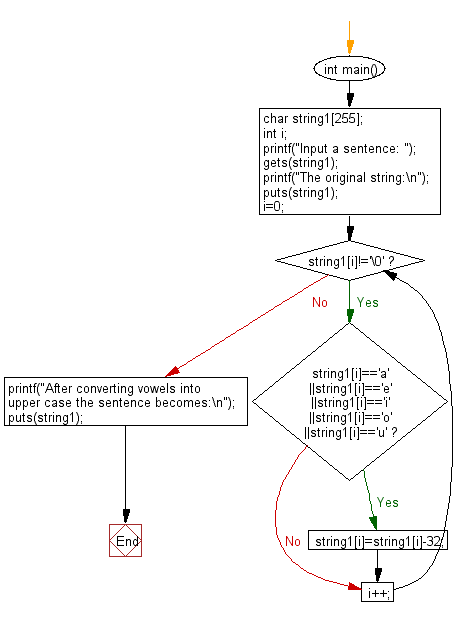C Programming: Convert vowels into upper case character in a given string
C String: Exercise-34 with Solution
Write a C programming to convert vowels into upper case character in a given string.
Sample Solution:
C Code:
#include
int main()
{
char string1[255];
int i;
printf("Input a sentence: ");
gets(string1);
printf("The original string:\n");
puts(string1);
i=0;
while(string1[i]!='\0')
{
if(string1[i]=='a' ||string1[i]=='e' ||string1[i]=='i' ||string1[i]=='o' ||string1[i]=='u')
string1[i]=string1[i]-32;
i++;
}
printf("After converting vowels into upper case the sentence becomes:\n");
puts(string1);
}
Sample Output:
Input a sentence: The original string: w3resource After converting vowels into upper case the sentence becomes: w3rEsOUrcE
Flowchart :

C Programming Code Editor:
Improve this sample solution and post your code through Disqus.
Previous: Write a C programming to count of each character in a given string.
Next: C Date Time Exercises Home
What is the difficulty level of this exercise?
Test your Programming skills with w3resource's quiz.
C Programming: Tips of the Day
Static variable inside of a function in C
The scope of variable is where the variable name can be seen. Here, x is visible only inside function foo().
The lifetime of a variable is the period over which it exists. If x were defined without the keyword static, the lifetime would be from the entry into foo() to the return from foo(); so it would be re-initialized to 5 on every call.
The keyword static acts to extend the lifetime of a variable to the lifetime of the programme; e.g. initialization occurs once and once only and then the variable retains its value - whatever it has come to be - over all future calls to foo().
Ref : https://bit.ly/3fOq7XP
- New Content published on w3resource:
- HTML-CSS Practical: Exercises, Practice, Solution
- Java Regular Expression: Exercises, Practice, Solution
- Scala Programming Exercises, Practice, Solution
- Python Itertools exercises
- Python Numpy exercises
- Python GeoPy Package exercises
- Python Pandas exercises
- Python nltk exercises
- Python BeautifulSoup exercises
- Form Template
- Composer - PHP Package Manager
- PHPUnit - PHP Testing
- Laravel - PHP Framework
- Angular - JavaScript Framework
- Vue - JavaScript Framework
- Jest - JavaScript Testing Framework
